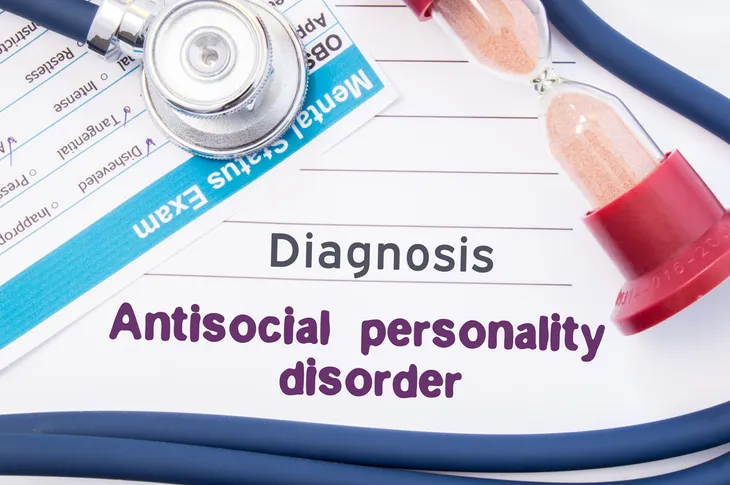When we talk about either a “psychopath” or “sociopath” we often picture some violent monster or criminal, but what do these terms really mean? What makes a person a psychopath or a sociopath and how can we tell? Despite how common these two terms are, neither of them are actually used in the medical profession. No one is ever officially diagnosed as a psychopath or a sociopath. They don’t exist in the mental health official handbook, the Diagnostic and Statistical Manual of Mental Disorders. In fact, both conditions are actually clinically perceived as an antisocial personality disorder (ASPD).
While they are both diagnosed under the umbrella of ASPD, there are some key differences between these disorders. To get better informed on the subject, we’ve created an article to compare psychopaths to sociopaths outlining all the differences, and even some similarities.
1. What is a Psychopath?
The term psychopath is often used by the general public to describe someone who doesn’t fit into society. This could be someone who suffers from a mental illness or is a violent criminal, but the real true definition of a psychopath is antisocial personality disorder. Healthline talked to Dr. Prakash Masand, a psychiatrist and the founder of the Centers of Psychiatric Excellence who describes ASPD as someone who shows patterns of manipulation and violation to others.
Healthline provides a list of the common signs of a psychopath which include, “socially irresponsible behavior, disregarding or violating the rights of others, inability to distinguish between right and wrong, difficulty with showing remorse or empathy, tendency to lie often, manipulating and hurting others, recurring problems with the law,” as well as a general disregard for safety and responsibility.
2. What is a Sociopath?
In a very similar explanation to psychopath, Healthline describes a sociopath as someone who has ASPD. They aren’t able to understand other people’s feelings, they often break the rules, make impulsive decisions, and will cause harm without feeling guilty. “People with ASPD may also use ‘mind games’ to control friends, family members, co-workers, and even strangers,” writes the source. “They may also be perceived as charismatic or charming.”
While it’s not clinically correct to distinguish the two terms by the severity of the disorder, the symptoms of a sociopath seem to be on a lesser scale than a psychopath. A sociopath may only make minor transgressions in the form of harm or distress to others, whereas a psychopath can be physically violent. These are both characteristics that fall under ASPD.
3. Do They Have a Conscience?
One of the biggest differences between a sociopath and a psychopath is the presence of a conscience. Our conscience is that little voice inside our head that helps us distinguish between right and wrong, says L. Michael Tompkins, EdD, a psychologist at the Sacramento County Mental Health Treatment Center to WebMD.
Psychopaths are notorious for not having a conscience which is how they are able to be so ruthless and calculated in their actions. They are able to lie, steal, and cheat without feeling even the slightest bit guilty. You might think this makes them easy to spot, but not necessarily! These are complex individuals. While their actions are often cold and calculated, Tompkins points out that they are also able to “observe others and then act the way they do so he’s not ‘found out.'”
On the other hand, a sociopath isn’t necessarily any better as a human being, but they have more of a conscience than a psychopath. However, their conscience is also weak. For example, they might feel guilty about stealing money from an elderly person but still follow through with it anyways.
4. Psychopath’s Are Harder To Spot
Most people likely assume that they’d recognize a psychopath or sociopath, especially since we often associate them with the idea of being some kind of violent monster like those portrayed in the movies. In actuality, these people do exist in the real world and like we said earlier, it’s not easy to pinpoint one. Not all psychopaths or sociopaths are violent. In fact, most aren’t. They often have spouses, children, and even a career. Psychopaths are some of the most successful people in society because of their ability to be ruthless, callous, and superficially charming toward others.
Psychopaths are more difficult to pick out because of their ability to mimic the emotions of others. On the surface, they are intelligent, charming, and friendly. Obviously we know they are not actually friendly and kind. They are extremely good at faking it and mimicking other people’s emotions in order to get what they want. “They are skilled actors whose sole mission is to manipulate people for personal gain,” says Tompkins to WebMD.
On the other hand, sociopaths aren’t as good at hiding their true intentions. They find it a little harder to play along, says WebMD. “They make it plain that they’re not interested in anyone but themselves. They often blame others and have excuses for their behavior,” adds the source.
5. Shared Characteristics
Psychopaths and sociopaths do share some characteristics, that’s why they both fall into the category of an antisocial personality disorder. They are both known for having a lack of empathy or remorse for others. They will not experience guilt which is how they get away with acting so callously. They do not like to take responsibility for their actions and often see themselves as above the law which is why they will have a complete disregard for laws and social conventions. They are more inclined to participate in violence than the average person. Lastly, “a core feature of both is a deceitful and manipulative nature,” writes Men’s Health.
6. Differing Characteristics
As we mentioned before, even though both personality disorders are diagnosed as ASPD, there are many key differences between the two. For example, psychopaths will try to portray the idea that they care, whereas sociopaths make it clear they do not. Sociopaths are much less emotionally stable and prone to fits of anger, whereas psychopaths are much more cold and calculating.
Sociopaths are more capable of emotional attachments than psychopaths, but their capacity is still limited. They often know what they are doing is wrong, but they’ll find ways to rationalize it, says VeryWell Mind. The last big distinction between the two is that sociopaths are often unable to maintain a regular work and family life, where as psychopaths can. This might seem like it should be the other way around, but psychopaths are great at “pretending.” The facade of a home life is most likely a cover for criminal activity.
7. Hot Headed vs. Cold-Hearted
WebMD explains the two different terms used to describe psychopaths and sociopaths. Psychopaths are often described as “cold-hearted” whereas sociopaths are deemed “hot headed.” What’s the story behind this? Well, some experts believe sociopaths are hot headed because they are better known for being irrational and acting without thinking about how others would feel.
Psychopaths on the other hand are much more calculated, and quite honestly, more dangerous. They are better at manipulating situations than sociopaths, so they’d never be caught acting on a whim. “They carefully plot their moves, and use aggression in a planned-out way to get what they want,” writes WebMD. “If they’re after more money or status in the office, for example, they’ll make a plan to take out any barriers that stand in the way, even if it’s another person’s job or reputation.”
8. Brain Differences
According to WebMD, the brain structure of a psychopath is different from the average person. Recent research shows that the psychopath’s brain “may have physical differences that make it hard for the person to identify with someone else’s distress,” writes the source. “The differences can even change basic body functions.” For example, when the average person sees something disturbing such as a gory scene in a film or if they are ever caught in a stressful situation, their heart will beat faster, their palms become sweaty, and their breathing quickens, explains the source. This would not happen in a psychopath. In fact, they often have the opposite reaction. A psychopath becomes more calm in stressful situations. This is why they are able to be so fearless and reckless with their behavior.
These brain differences are also a key difference that sets psychopaths apart from sociopaths who do not showcase the same differences.
9. Which One is More Violent?
Both psychopaths and sociopaths suffer from a major lack of empathy. This is one of the reasons they are so dangerous. Aaron Kipnis, PhD, author of The Midas Complex tells WebMD that they both struggle with putting themselves in other people’s shoes and understanding how they feel. They often view others as objects that they can manipulate and use for their own benefit.
Since psychopaths and sociopaths are often portrayed on television and in the movies as violent criminals or killers, we tend to associate these disorders with violence. This isn’t necessarily the case. In fact, most psychopaths aren’t violent. There are varying degrees of this personality. You might even encounter one in the workplace and not even realize it! They won’t necessarily be violent in nature, but they may be cold and calculating in how they move up the corporate ladder.
It’s important to note that just because a person showcases one or two of the traits we’ve listed here, it doesn’t necessarily mean they are a psychopath or a sociopath. People are often tempted to diagnose others with these terms, but more often than not, someone who acts mean or selfish doesn’t have a personality disorder.
10. When Committing Crimes…
While they aren’t often upstanding citizens in society, they won’t necessarily be found getting into trouble with the law. Men’s Health writes that “successful” psychopaths are more likely to commit premeditated crimes. However, they are smart enough to avoid getting in trouble. They would be more likely to manipulate someone else into breaking the law for them so that they don’t get into trouble. “They’re master manipulators of other people’s’ feelings, but are unable to experience emotions themselves,” adds the source.
In addition to this, psychopaths are much more organized. If and when they do commit a crime, it will be premeditated and methodically planned — down to the smallest detail. They will calculate all the risks in order to avoid detection. “The smart ones will leave few clues that may lead to being caught. Psychopaths don’t get carried away in the moment and make fewer mistakes as a result,” says Men’s Health.
Sociopaths on the other hand aren’t as good at hiding their emotions or mastering up premeditated crimes. They are capable of commiting both violent and non-violent crimes, but unlike psychopaths, they will often act on compulsion, so they are more likely to get caught. “And they will lack patience, giving in much more easily to impulsiveness and lacking detailed planning,” says Men’s Health.
11. Nature vs. Nurture
According to Men’s Health, there are some experts who don’t believe psychopaths and sociopaths should be differentiated. However, arguably the biggest differentiating factor between the two that most experts agree on is the argument of nature versus nurture. Psychopaths are born, whereas sociopaths are made. Psychiatrists will use psychopathy for someone who seems to be born with antisocial personality disorder, whereas sociopathy is often the result of a brain injury or any abuse/neglect from childhood.
We previously discussed how psychopaths have a different brain structure than a ‘normal’ person which is why they are believed to be born with the disorder. It’s the result of faulty brain “wiring,” says the Huffington Post. This is probably why psychopaths are the more extreme version of ASPD. They aren’t able to feel emotions at all, where as sociopathy has no ties to genetics. They do possess the ability to feel empathy and love, just in a limited capacity.
12. They are Both Diagnosed as ASPD
While we’ve managed to pinpoint some specific differences between a sociopath and psychopath, clinically there is no difference between the two. They both exhibit behaviors that fall under the symptoms of ASPD. To the general public, people often use these terms interchangeably when referring to someone who may seem like a violent criminal, has committed crimes, or who just doesn’t fit into society, but neither term is a real diagnosis. “Some people make an artificial distinction based on severity of the personality disorder but that’s incorrect,” says Dr. Masand to Healthline. Both terms are just a way to describe ASPD.
The most confusing part about psychopaths and sociopaths being diagnosed as ASPD is the “antisocial” part because psychopaths in particular are able to socialize with others. “Most people might assume this describes someone who is reserved, a loner, keeps to himself, etc. However, this is not the case in ASPD,” says Dr. Masand. “When we say antisocial in ASPD, it means someone who goes against society, reules, and other behaviors that are more commonplace.”















